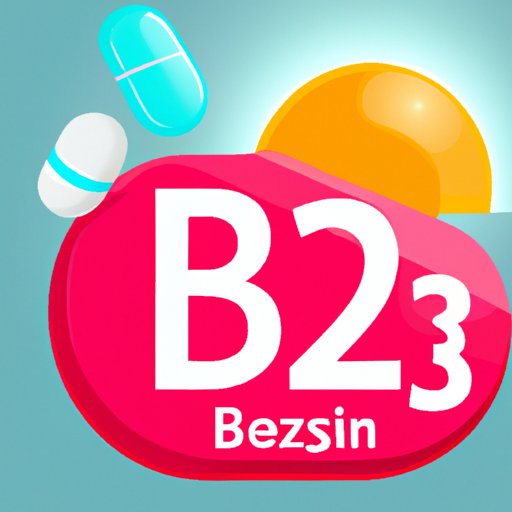Introduction
Vitamin B12 is an essential nutrient that supports many areas of health, such as cognitive function, metabolism, and energy levels. It is also known as cobalamin and its chemical structure makes it unique among all other vitamins. In this article, we will explore the health benefits of vitamin B12 and discuss whether or not supplements are necessary.
Are Supplements Necessary? A Look at Vitamin B12
Vitamin B12 is found naturally in animal-based foods, including fish, eggs, poultry, and dairy products. If you’re following a vegan or vegetarian diet, it can be difficult to get enough vitamin B12 from food sources alone, so supplementation may be necessary. Additionally, some people may have difficulty absorbing vitamin B12 due to certain medical conditions, such as pernicious anemia. In these cases, supplementation may also be recommended.
Understanding vitamin B12 deficiency is the first step to determining if supplements are necessary. Symptoms of deficiency can include fatigue, muscle weakness, nerve damage, anemia, and memory loss. A blood test is usually used to diagnose deficiency, and treatment typically involves taking a daily supplement. It is important to note that while vitamin B12 supplements are widely available, they should only be taken under the supervision of a healthcare provider.
In addition to understanding vitamin B12 deficiency, it is also important to look at the link between vitamin B12 and cognitive function. Studies have shown that low levels of vitamin B12 can lead to a decline in cognitive skills. While the exact mechanism is unclear, researchers believe that vitamin B12 helps regulate the brain’s neurotransmitters, which are involved in learning and memory. Therefore, maintaining adequate levels of vitamin B12 is essential for optimal cognitive function.
The Role of Vitamin B12 in Metabolism
Vitamin B12 plays an important role in metabolism. It helps break down fats and proteins, which are important for energy production. Additionally, vitamin B12 is involved in the formation of red blood cells, which carry oxygen throughout the body. Low levels of vitamin B12 can lead to anemia, which can cause fatigue and weakness.
Vitamin B12 also plays a role in maintaining healthy cholesterol levels. Studies have shown that people with higher levels of vitamin B12 have lower levels of both total cholesterol and “bad” (LDL) cholesterol. Furthermore, vitamin B12 has been linked to a reduced risk of heart disease, stroke, and other cardiovascular diseases.
Finally, vitamin B12 is essential for healthy skin, hair, and nails. It helps the body produce keratin, which is a protein that strengthens nails and gives hair and skin their elasticity. Vitamin B12 also helps keep the skin hydrated and protects it from damage, which can help reduce the signs of aging.
Conclusion
In conclusion, vitamin B12 is an essential nutrient that plays a role in many areas of health, from cognitive function to metabolism. It is found naturally in animal-based foods, but those on a vegan or vegetarian diet may need to take supplements to ensure they are getting enough. Additionally, those with certain medical conditions may not be able to absorb vitamin B12 from food sources, so supplements may be necessary. Ultimately, maintaining adequate levels of vitamin B12 is essential for optimal health and well-being.
To sum up, vitamin B12 is an essential nutrient that supports many areas of health, from cognitive function to metabolism. For those who do not get enough vitamin B12 from food sources, supplementation may be necessary. However, it is important to speak to a healthcare provider before taking any supplements. Overall, vitamin B12 plays an important role in overall health and should not be overlooked.


